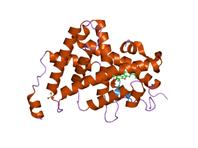The other day someone asked if it was possible to be partly hypo. I said, I thought it was, not expecting to see a paper backing that up within days.
What I have no idea about is what anyone told they have a defective TRalpha1 can or should do about it! Not a hint of treatment options, not even a speculative comment.
Also note, this is one of the few papers I have read which categorically suggests rT3 might be relevant to screening/diagnosis.
Biochim Biophys Acta. 2013 Mar 22. pii: S0304-4165(13)00096-2. doi: 10.1016/j.bbagen.2013.03.018. [Epub ahead of print]
Resistance to Thyroid Hormone mediated by defective thyroid hormone receptor alpha.
Schoenmakers N, Moran C, Peeters RP, Visser T, Gurnell M, Chatterjee K.
Source
Institute of Metabolic Science, University of Cambridge, UK.
Abstract
BACKGROUND:
Thyroid hormone acts via receptor subtypes (TRa1, TRß1, TRß2) with differing tissue distributions, encoded by distinct genes (THRA, THRB). THRB mutations cause a disorder with central (hypothalamic-pituitary) resistance to thyroid hormone action with markedly elevated thyroid hormone and normal TSH levels.
SCOPE OF REVIEW:
This review describes the clinical features, genetic and molecular pathogenesis of a homologous human disorder mediated by defective THRA. Clinical features include growth retardation, skeletal dysplasia and constipation associated with low-normal T4 and high-normal T3 levels and a low T4/T3 ratio, together with subnormal reverse T3 levels. Heterozygous TRa1 mutations in affected individuals generate defective mutant receptors which inhibit wild-type receptor action in a dominant negative manner.
MAJOR CONCLUSIONS:
Mutations in human TRa1 mediate RTH with features of hypothyroidism in particular tissues (e.g. skeleton, gastrointestinal tract), but are not associated with a markedly dysregulated pituitary-thyroid axis.
GENERAL SIGNIFICANCE:
Human THRA mutations could be more common but may have eluded discovery due to the absence of overt thyroid dysfunction. Nevertheless, in the appropriate clinical context, a thyroid biochemical signature (low T4/T3 ratio, subnormal reverse T3 levels), may enable future identification of cases.
Copyright © 2013. Published by Elsevier B.V.
PMID:
23528896
[PubMed - as supplied by publisher]
ncbi.nlm.nih.gov/pubmed/235...
Rod
If I have got it right, the picture is of a thyroid hormone receptor alpha 1.

